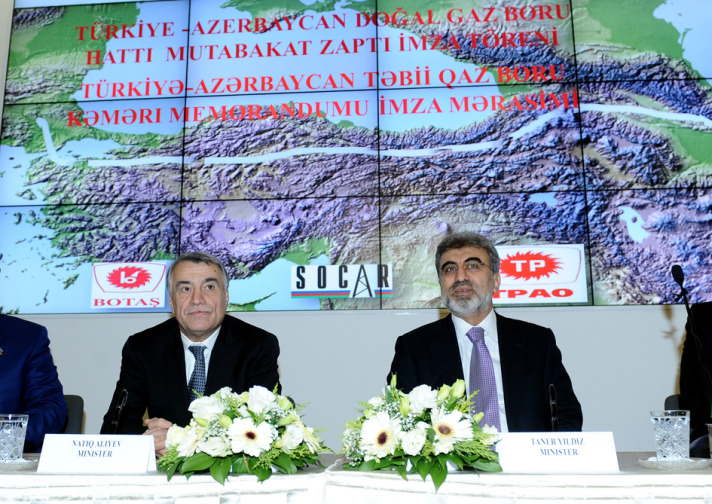
Trans-Anatolia Gas Pipeline: Wider Implications of Azerbaijan’s Project (Part Two)
Publication: Eurasia Daily Monitor Volume: 9 Issue: 4
By:

Timing, route, and parameters make Azerbaijan’s Trans-Anatolia Gas Pipeline a game-changing project. Planned to run from the Georgian-Turkish to the Turkish-Bulgarian border, with a capacity of 16 bcm annually, and scalable to 24 bcm, the line would cost $5 billion to $6 billion to build within five years. Azerbaijan is entitled to as much as 80 percent of the shares in this project on Turkish territory. Baku would finance the construction proportionately with its ownership stake, and control the pipeline’s future operation (“Direct Road to Europe: Azerbaijan’s Trans-Anatolia Gas Pipeline Project,” EDM, January 4).
This project would connect the Caspian basin directly with Europe for the first time. It effectively replaces the Nabucco project in Turkey, thanks to Azerbaijan’s capacity to finance the trans-Anatolia project, for possible link-up with an abridged Nabucco in Europe (see EDM, January 5). The implications are not all or necessarily positive, however.
• Implications for the EU’s Southern Corridor:
Nabucco, the ITGI (Interconnector Turkey-Greece-Italy), and TAP (Trans-Adriatic Pipeline, also running from Turkey to Italy), nominal components of the EU’s Southern Gas Corridor, compete against each other over 10 bcm of Azerbaijani gas from Phase Two of Shah Deniz production. Those projects, plus British Petroleum’s Nabucco-substituting concept, were all submitted as of October 1, 2011 to the Shah Deniz producers’ consortium, in a winner-take-all tender. The consortium’s decision is now expected in March 2012. The European Commission has clearly prioritized the strategic Nabucco over the non-strategic ITGI and TAP.
Given Nabucco’s cost overruns and the European financial crisis, however, the smaller and cheaper ITGI and TAP may look more doable to Azerbaijan and other Shah Deniz gas producers. In that case, Azerbaijani gas would go from the trans-Anatolia pipeline toward Greece, the Adriatic coast and Italy, instead of the Nabucco partners, which need both the volumes and the diversification.
• Implications for Georgia:
Georgia enjoys a win-win position on the transit route from Azerbaijan to Turkey. The trans-Anatolia project, at 16 bcm to 24 bcm annually, presupposes at least doubling the capacity of the pipeline through Georgia, and at least trebling the gas flow from the present level. Known as Baku-Tbilisi-Erzurum (BTE, although its jurisdiction stops at the Georgia-Turkey border) or South Caucasus Pipeline (SCP), the line has a declared capacity of 8 bcm per year at the Georgia-Turkey border, but has been operating invariably below capacity.
The Shah Deniz gas producers are also the owners of this pipeline. The two consortiums are identically structured (BP and Norway’s Statoil with 25.5 percent each; Azerbaijan’s State Oil Company, Total of France, Russian Lukoil, and Iran’s NICO with 10 percent each; and Turkish Petroleum with 9 percent). Irrespective of the ultimate destinations of Azerbaijani gas in Europe, the pipeline in Georgia will have to be brought up at least to the trans-Anatolia pipeline’s capacity.
• Implications for Turkmenistan:
The trans-Anatolia pipeline does not envisage a transportation solution for Turkmen gas to Europe. The immediate priority of Azerbaijan is to open access for its own gas to European markets. According to Azerbaijan’s State Oil Company President, Rovnag Abdullayev, Baku would pursue a link-up with Turkmenistan in a follow-up stage (www.1news.az, December 28).
However, accessing Turkmen gas via Azerbaijan is a high priority of the EU’s external energy policy. Mandated by the EU’s 27 countries, the European Commission is negotiating at top levels with Azerbaijan and Turkmenistan on a trans-Caspian gas pipeline. Ashgabat has demonstrated its keen interest during these negotiations, as well as publicly; and has started building a pipeline from the country’s interior to its Caspian shore, for an ultimate capacity of 30 bcm per year, in anticipation of a trans-Caspian link to Azerbaijan.
According to President Ilham Aliyev, Azerbaijan is becoming a new “gas nation,” producing as well as transiting gas to Europe (Trend, January 1, 2012). The transit role is also reflected in the joint declaration by President Aliyev and European Commission President, Manuel Barroso (January 13, 2011), which helped to accelerate the discussions with Turkmenistan.
At the launch of Azerbaijan’s trans-Anatolia project, presidential adviser Elnur Aslanov noted that Azerbaijan envisions its future both as a producer and as a “major transit country for Central Asian gas. Both roles underpin Azerbaijan’s strategic significance” (www.1news.az, December 27).




